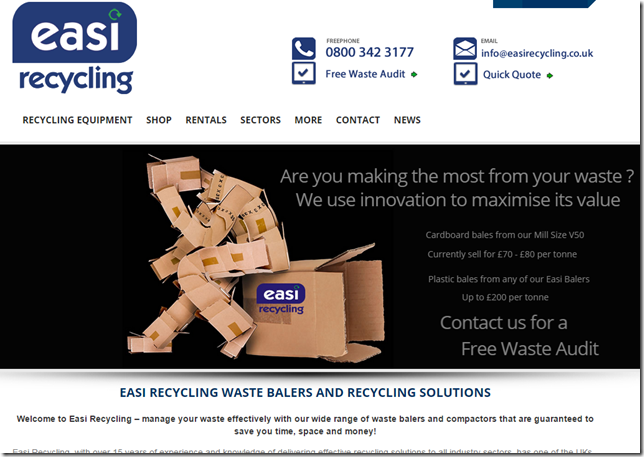Societies have been recycling since time began in a bid to improve their environment. Nowadays, many entrepreneurs have taken on the duty by establishing their own enterprises. If you look at companies, like Waste Management, you’ll see how profitable it can be if it’s done well.
Range of Recycling Equipment
Recycling equipment such as waste balers and compressors are now common in recycling facilities. It’s true, though, that ordinary people hardly understand the meaning of these innovations. Let’s take a look at two terms:
Balers, derived from the word ‘bale’ (to make a large bundle) are recycling machines used to compact any sorted recyclable material into smaller, more manageable units. Waste materials such as plastics, papers, boards and cans are usually compressed into units and later baled before delivery to garbage centers for disposal.
Compactors are more or less the same as balers with the same functionality. Nevertheless, compactors are usually used to compress (‘compact’) a chunk of unsorted waste material.
You’ll also be able to purchase recycling stations, compressors, and presses for sale. Whatever kind of waste management situation you have, you’ll find that there is a solution.
Residential vs. Commercial
Generally, residential-use balers and compactors are normally refrigerator-size recycling equipment with a push button facility that eases operation. This means they are developed to suit most operating environments. Most of this kind of recycling equipment is small in size, simple to use and excellent in producing smaller waste bales that are easy to handle and light-weight.
For commercial operations, balers and compactors are important recycling equipment because of the introduction of environmental conservancy programs and their legal requirements. So, balers and compactors are needed for consolidating waste material into manageable units for haulers to weigh and transport.
Where’s there’s muck, there’s brass
It might surprise you that using a commercial service may help you in several ways you hadn’t considered before. Recycling industries are usually in business and therefore they buy the recyclable trash from hauling companies. The waste material is weighed and priced per an agreed price per unit weight.
Secondly, the use of recycling equipment reduces the number of trash cans a company has to buy in cases where there is a large amount waste involved. In return, a company saves money that can be used for other purposes. It helps also to control the amount of space devoted to storing waste, saving valuable rental costs.
Finally, balers and compactors compress waste material making it look neat and well contained. This will enhance the image of a company as well as its overall conditions. After all, you don’t want a lot of garbage lying around, do you? It wouldn’t look great for customers.
So, if your organization is generating waste; and facing rising costs because of that, compactors and balers may bail you out of a tricky situation. They can be used by schools, as well as manufacturing industries, hospitals and recycling companies.
Essential requirements for Equipment
However, proper guidelines and manual instructions must be followed. This means any operator handling the machine should check the unit with the safety code and adhere to the instructions. The responsibility for safety wholly depends on the operator.
Specific personnel will need to be trained with the right skills to operate the equipment. And the machines should be serviced as per the manufacturer’s manual guidelines, to prevent problems and achieve maximum efficiency.
All in all, waste management difficulties becomes a problem of the past with these ‘beasts’ in-house. Therefore, don’t be reluctant to purchase this kind of Easi Recycling equipment, weigh the advantages first, then you’ll definitely make the right decision.
If you’re not investing in equipment, you should certainly consider the opportunities for investing in companies in this space. How many multi-billion dollar companies will be needed to provide waste management services for the developing world. Like I said, “Where there’s muck, there’s brass”.
